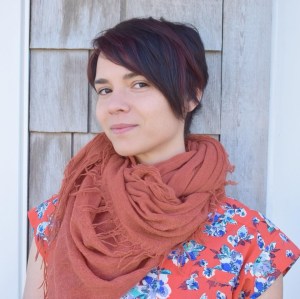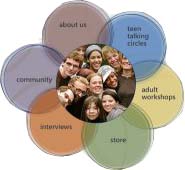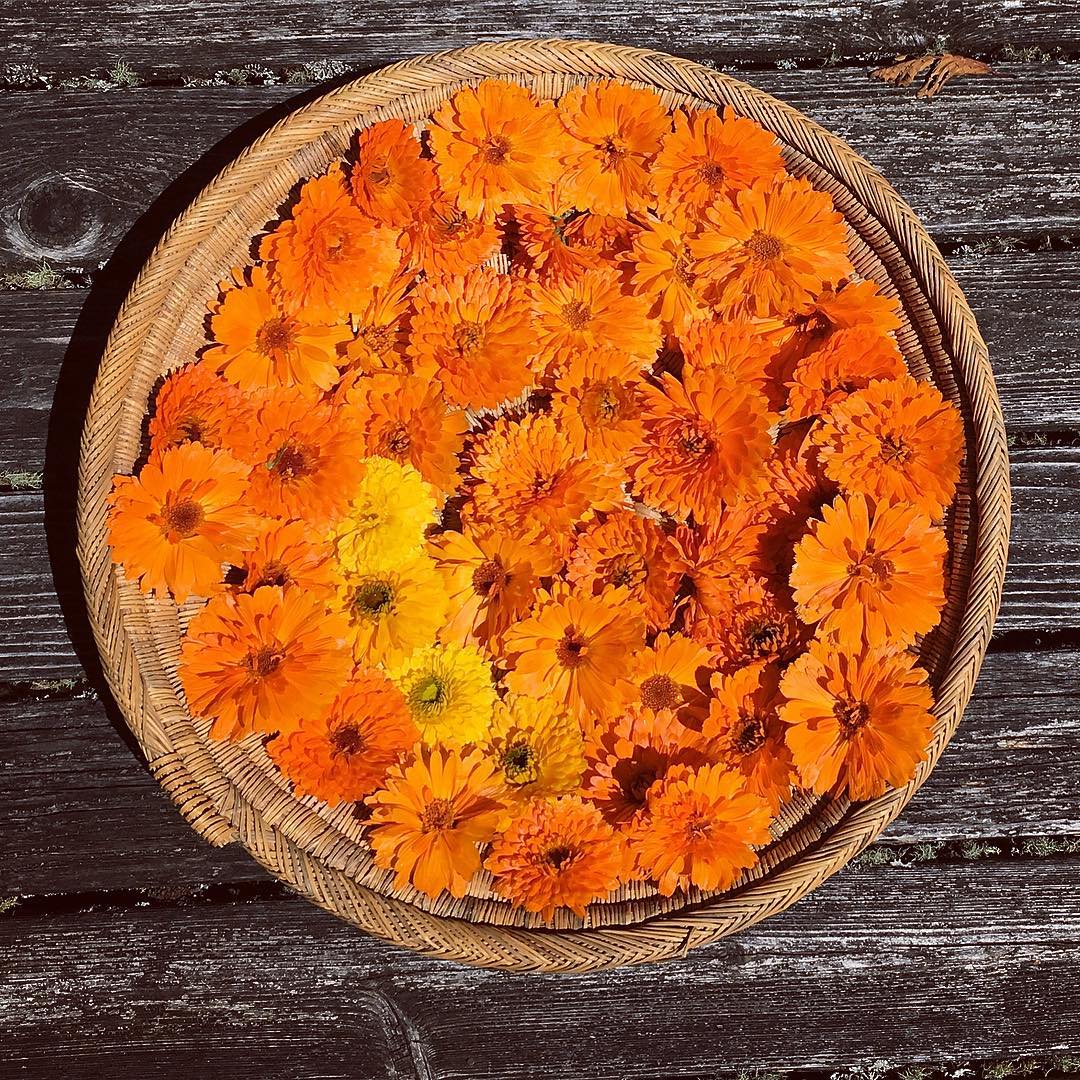In early May, three 8th graders from Hyla Middle School, an independent private school on Bainbridge Island, asked to interview Linda Wolf, TTC Founder and Executive Director in support of their final project for their Global Communities class. The culmination of this class project is scheduled to be presented at the Living Futures unconference in Seattle on May 18th.
At Hyla Middle School, 8th grade students have the opportunity to explore issues that impact their lives through the Living Futures Global Education curriculum. This year, students have focused their energies on a wide array of issues including environmental and inclusivity issues of the Puget Sound area, and building community for youth. This particular group focused on inclusivity and community building for youth on Bainbridge Island, WA. Their goal is to bring attention to strategies and solutions that can serve as potential models for other communities. As teens, they understand the need for change and see themselves as active agents in that change.

Hyla Middle School 8th Graders
In this interview, Linda Wolf touches on poignant topics such as connection, empowerment, activism, substance abuse, grief, self-love and compassion and how TTC builds vibrant and authentic relationships that support and empower us in our personal growth which informs our capacity to affect social change.
On a personal note, as assistant to the Directors of TTC, I was deeply moved by the reactions of the teens listening to Linda speak. Their faces softened, their voices relaxed, and their eyes seemed to fill with relief. They were nodding their heads, saying, “Yes! Yes! This makes sense!”
It was an honor for me to witness this connection and I believe the true strength of our organization is that it allows us to see each other and connect in this deep way, listening from the heart and being heard and witnessed profoundly heals our wounds and this positively impact everything from our personal relationships to deep divisions in the political and social climates. Please let us know your thoughts and take-aways from this interview.
To listen to this interview on Soundcloud, click here.
Thanks for reading,
Jeny Rae Vidal
Assistant to Directors at TTC
Olivia: How long have you been on the Island?
LW: Since 1990
Olivia: How long have you been with TTC?
LW: Since 1993
Olivia: So, do you feel like you are pretty tapped in to the community of youth, ages middle age to high school?
LW: I have a lot of experience in the past but I haven’t worked directly in circle with teens on the Island for a few years; I run a middle school aged circle in Seattle, now. But, we look forward to offering multiple local circles on the island, starting this Fall.
Olivia: How would you describe the youth community on Bainbridge?
LW: I would say, in general the youth on Bainbridge are pretty privileged, mostly white, upper to middle class – they have mostly college-educated parents who are either stay-at-home parents or business people. The kids here have a lot of opportunities to be in nature versus growing up in the city. Being on Bainbridge is sort of like living in a gated community. I think there is a lot that young people on Bainbridge are missing out on though – one of the most obvious is a connection with youth from Suquamish. There is a whole diverse culture that is only 5 minutes away that this community has not merged with… and you don’t get that in cities where there tends to be much more diversity. I do see youth on this Island going through the exact same things that youth go through all over the world go through in general as adolescents and teens, though I think many youth on this island are perhaps more conscious about alternative ways of living.
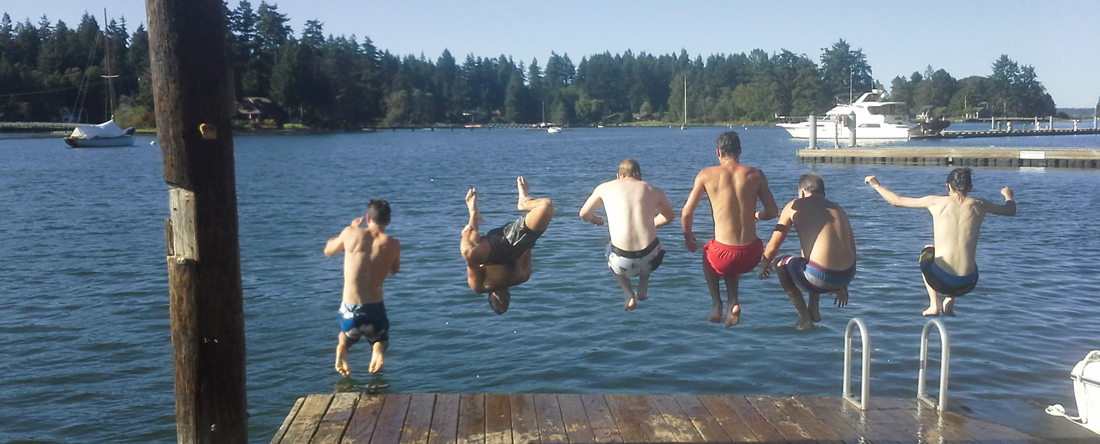
Dock Jumping on Bainbridge Island, WA
Jacqueline: Do you see patterns in middle school or high school that lead to drug use, alcohol use, failing classes or school?
LW: Yeah, I do. The way I would describe the biggest problem for all of us in this world, including teens, is that we live in a toxic system – an unhealthy paradigm of dominance versus partnership. The larger paradigm is one of power-OVER instead of power-WITH. For example, white men over everyone, men over women, adults over children, people over animals, people over the planet. It’s dominating and controlling power versus cooperative partnering and collaboration. We live in a system that doesn’t honor compassion, cooperation, sharing, communication, true friendship, equality, and respect as primary principles to live by, even if we espouse it as a value. We live in a system of power over. “You are less important than me because I am an adult. You are less important to me because you’re brown. You’re less important because you’re Jewish. You’re less important because you’re a woman. You’re less important because you’re gay.” It’s all about domineering over people, the planet, animals. How can we be well when we live in a system where the paradigm is dominance?
We need a system of power-with, a paradigm of cooperation and partnership. I think that is the biggest problem we all have. Every single solitary one of us world-wide. The most important thing for me is to create something that holds us all in partnership, in cooperation, and respect – that has been the overriding value of the Teen Talking Circles Project. TTC is not about an adult coming in to a circle and lording over you. We are not going to try to mentor you, fix you, or tell you how to live.
TTCs are about listening and having the answers and wisdom come from you. What is it that you are longing for? What is it that you want out of life? As a facilitator we’re saying I was once a teenager, and even though I am 67 I have the teenager in me just like every adult has the teenager in her. Your parents have a teenager still inside of them. You happen to be teenagers. It’s co-mentoring that is most important to us. What do you know that you can teach me? What do I know that I can teach you? This creates a space where we can be truthful with each other.
Alcohol and drugs are a complex issue. What drugs are we talking about? Are we talking about marijuana? Are we talking about MDMA, acid, heroin, cocaine, meth?
Olivia: We are talking about substance abuse in general… It could be anything, like sugar.
LW: That’s a complex subject. Much of it has to do with wanting to escape our feelings. When we want to escape our feelings, we could do it in a number of destructive ways, as you say, through sugar, overeating, alcohol, cutting, sex –all kind of ways to distract ourselves and numb ourselves to real life and our feelings. The opportunity that life affords us is to feel grief – and joy. When we feel grief, our hearts break open and that is where the compassion comes in, the self-love comes in. If we are trying to avoid feeling pain, we’re going to use all kind of methods to avoid the wound, the pain, the grief, the shame.
What Teen Talking Circles gives us an opportunity to do is to share those feelings and find out that for goodness sakes, we are not alone. We all feel the exact same things. We all bleed red blood. We all have hurt. We all have shame. We all have wounds… so what?! That doesn’t mean that’s who you are; who you are is so much bigger. To see who you are is also a great healing and helps us to not want to divert, numb ourselves, leave the room, avoid people, not be real, or not be authentic. Right?
Olivia, Jacqueline, Keenan: Yeah! Yeah!
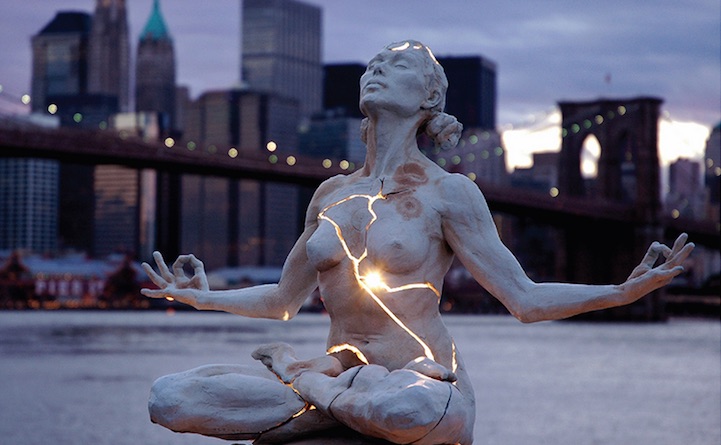
“There is a crack in everything. That’s how the light gets in.” — Leonard Cohen Expansion: Sculpture by Paige Bradley
LW: See, these are things you already know… Young people have their ear to the world like listening with a stethoscope. Someone just said to me recently, “We radio out what we are feeling, seeing, imaging.” We radio it to each other energetically. That’s why we can feel what’s going on with other people at school. You know when someone’s giving you the eye. They don’t have to say a thing. You know when you feel safe – you know when you don’t. How are you to trust an adult if you feel an adult is not walking their talk? If you feel an adult isn’t facing themselves? How are you going to trust an adult if you know an adult isn’t really going to listen to you? How do you know when you are really being heard? Being heard is one of the greatest gifts you can give each other. Being heard heals us.
For years, I couldn’t say what I thought about “drugs,” like pot. I’ve wanted to just say to adults, ‘Look, there is going to be experimentation in the teen years, face it. Why? Mostly because they just want to know what is it already!’ Young people just don’t want to feel dumb around other young people who have done it and have to say they don’t know what it’s like. Now, there is religion, wisdom, parental advice that young people need to hear, no doubt about that … of course the advice I gave to my daughters was “don’t do it!” but the reality is that there is going to be experimentation. I experimented as a teen and almost everyone I know has experimented as a teen.
But, there is a real difference between experimenting safely and abuse, self-harm, or lack of self-esteem. I would bet that teenagers have been experimenting in every generation since there was ever a group called “teenagers” and adults haven’t liked it because we know that it can cause so much pain and worse. We know the pain that can happen but sometimes we have to let our kids find that pain, otherwise they will never learn – never make their own choices. They need to ask themselves what is a boundary that I don’t want to cross? How do I create a happy life? What is a healthy life? Balance. Balance.
TTC is an extraordinary place for young people to come together and be heard wherever they are at. We stand by the idea that if we as facilitators hear you or feel that you are hurting yourself with drugs or anything or being hurt by anyone, we are first going to encourage you to talk about it – and if we feel it is dangerous to you or others, we’re going to stand with you to get help outside of circle. But young people who are experimenting with something like pot and talking about it and showing up consistently to circle every week… we’re going to think you’re pretty much doing ok, most likely. But we’re going to ask you to dig into what is behind what you’re doing and the choices you’re making. It is all about balance and well-being and our facilitators are trained to be conscious about all this. As a circle, we all agree to this on day one. This is talking circle – this isn’t psychotherapy, although it is very therapeutic. The thing about TTCs is that one of the basic agreements that we make with youth in circle from the get-go is that we are all coming to circle to become healthier, wiser, and more self-loving and self-accepting as well as caring about each other and others in general. So we assume that is what you want if you are committed to coming to circle each week.
Also, you young ones are the ones who become activated the quickest if you see or hear that one of your circle mates is hurting themselves or being harmed. Often in circle you would be the ones to ask permission from Joe to talk about it with him. We’ve seen this many times in circle. You develop real care for your brother or sister in circle and it becomes another opportunity to become co-mentors to each other, which is really a beautiful thing. This is part of the empowerment and growth young people develop and practice in themselves and with each other in circle.
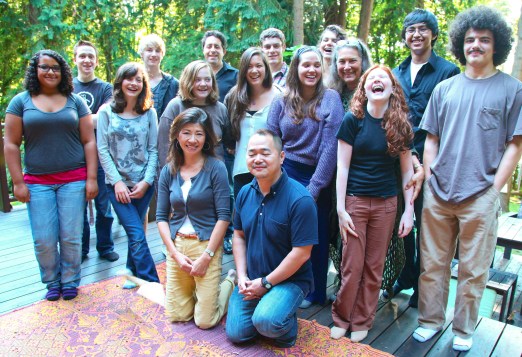
TTC on Bainbridge Island
Olivia: What kind of social changes have you seen over your time here on Bainbridge Island?
LW: I think change is cyclic. Things change but then they come back to be dealt with again and again but from a new place. It’s the same in our personal lives. We make changes and then time goes on and we have to learn the lessons all over again, each time growing and evolving.
Over the last 20 years, circle has stopped being such an odd, unusual thing. It’s more common to have a “Gender Talks” group or guy’s circle, where guys are looking at the cost of sexism to them. I would say that activism is a lot more normal. Sexual identification is more gender fluid. But, it seems to me, from a larger perspective we’re back to a starting point on some of the same issues we had 20 years ago, especially right now with our current president, his administration, many of those who voted for him and a general political climate in the world right now. For us in the US, the rug has been lifted up and the stuff that has been swept underneath it for a long time is coming out again. Many of these issues came up when I was 16 and I was working against nuclear power, war, sexism, homophobia, racism – working for civil rights, for environmental issues, for women’s empowerment. I think this is coming back up to the forefront and young people and adults are going to have to awaken on a whole new level.
Keenan: How did TTC come about?
LW: TTC started because a friend and I wanted to write a book for teens, telling them everything we had learned that could help them navigate the teen years. We brought together 21 teens from Bainbridge and Suquamish ages 13-21 and we met for 10-weeks and created safe space to find out what the issues were for each one of the teens in the room and what they wanted the book to be about. We called our first circle a focus group – to focus on the issues — and a safe space to tell the truth. After 10-weeks, we thought we would write this book on teenagers for teenagers. We didn’t want to write another book for adults that would make adults feel comfortable about teens. We wanted to write one teens would pass to teens. Just so we’re clear — adults aren’t ever, usually, going to feel comfortable about your teen years, especially parents; it’s scary for them. They know what can go wrong. It’s scary and it’s exciting, and sometimes you live out what your parents did or didn’t do or what they wished they could have done and it’s crazy – very complex.
Anyway, after 10-weeks was up the girls in circle said, “Please! Please don’t stop, we have nowhere else to tell the truth like this! We have no place where we can totally be real and tell people what’s going on with us without being judged, labeled, punished, or where we are vulnerable to gossip or it being used against us.” So, we kept the circle going for two years and then we wrote the first book, “Daughters of the Moon, Sisters of the Sun: Young People and Mentors on the Transition to Womanhood.” Afterwards, we kept meeting every week. Actually a lot of kids from Hyla were part of our first circles. We held circle outside of school so none of the kids would get in trouble from the teachers or administrators if they talked about the more edgy stuff. The book ended up selling over 50,000 copies and was so successful people helped us start the nonprofit so that we could train other adults to lead circles in their communities.
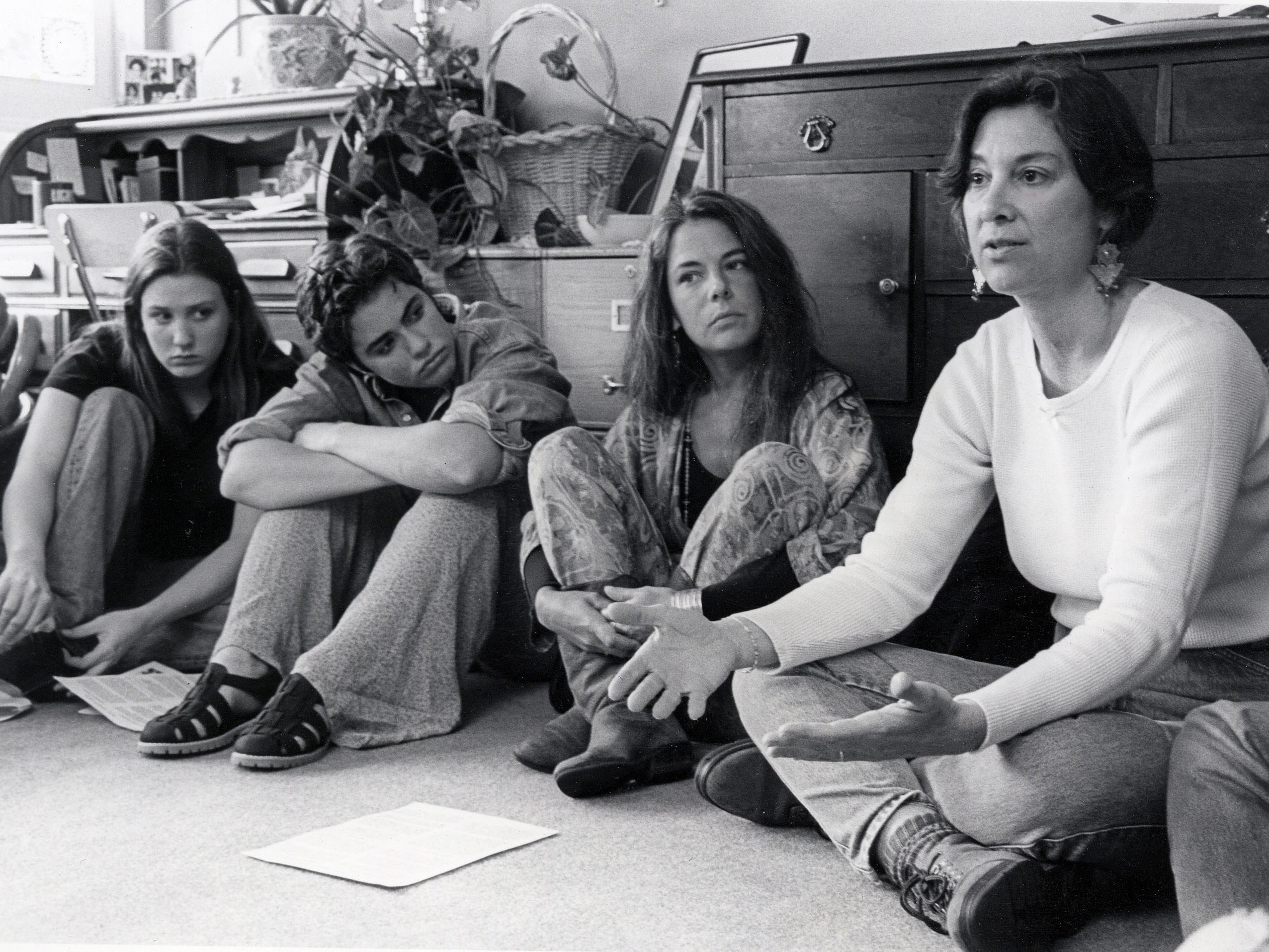
First Teen Talking Circles with Co-Founders Wind Hughes and Linda Wolf
Years later, we wrote a second book called Global Uprising: Confronting the Tyrannies of the 21st Century – Stories of a New Generation of Activists. The idea being that each of our personal issues are connected to global issues. For example, one of my personal issues as a teen was over-eating, which is how I tried to escape my feelings of insecurity and lack of self-esteem, I just ate and ate. I didn’t know how to throw up, I would just stuff myself with food and eventually cry. It was a paradox.
So where does that come from? I felt too fat. Why did I feel too fat? My mother was a fashion model and I compared myself to her. Where else was I getting the message that I was ugly if I was fat? Magazines, TV, movies. Who was selling me those magazines? Men and corporations interested only in exploiting me though promoting cultural norms around what a woman should look like and though ads in those media sources. How did I come to feel so objectified? Sexist messages were coming in from all sides. So, we once I started identifying and connecting my personal issues to global issues and started seeing all of the tentacles that interwove in creating my thinking that I was not good enough, I could start to take some action. I could become an activist. Once we can identify with our power to take action, we no longer have to be muted or overwhelmed by our personal issues.
Global Uprising came about because we were inspired by the WTO protests in Seattle that happened in 1999, where young people came together from around the world protesting these very things – Advertising messages, sweatshop labor, animal cruelty, the prison industrial complex, institutionalized racism, etc. Global Uprising is a book for teens, your age, that will teach you what’s wrong and why are we are behaving this way.
Olivia: So, what you are really saying is that we need empowerment?
LW: Again, a very deep question with many answers, empowerment. What is true empowerment? What I learned recently was that there is a real difference between force and power. True power can be very graceful, something I have to learn myself because I fought so hard in the 60s and still feel like I have to fight hard what’s going on in our country today. One of the greatest ways to have true power is through self-knowing, to cultivate self-respect and respect for others. To see your elders and the authority figures around you as human beings. To understand what it means to change the paradigm from power-over to power-with. There are many ways we can nurture our own agency. Being around people who support and uplift you is also so important, which is what circle offers.
Who are you? See yourself. You’re not this little thing that’s been labeled you. You are this enormous consciousness, you are not limited. You’re everything. What happens with a lot with young people is that someone will say to them, “Who do you think you are?” That’s disempowering beyond belief.
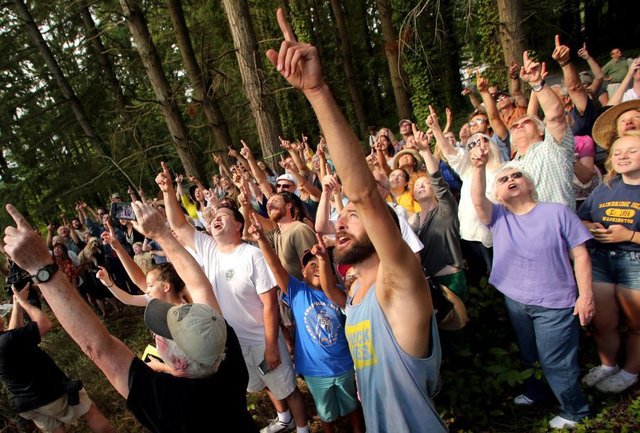
“Girl in the Tree” Protest on Bainbridge Island. Driven by a deep sadness that her home town was developing unsustainably, teen activist, Chiara Rose protests 800+ trees being cut down for shopping center build. Hundreds of people show up in support of her. Great example of bringing the personal issues to external action.
TTC: Let’s turn the tables for a minute and ask you teens something. What one thing do you wish adults knew about the teen community?
Keenan: I would like them to know that we are mature and if we show that we are mature they need to know that we can handle more. Sometimes, say they are mature and their parents still treat them that they are not
Jaqueline: Here at Hyla, adults trust us that we are going to do the right thing… maybe a few of us need a steer in the right direction every once in a while. I think adults should know that we can make the right decision but nobody can always make the right decision.
Olivia: I want them to know that we are ready. With Internet and everything, there isn’t a time in our lives that we don’t know. There is no use crying about it, it’s done – you can’t stop it. You have to stop protecting us from things we already know because it’s counter-productive and annoying. All of that effort can be used to teaching us knew things. Of course, we are going to make our stupid jokes and goof around but we are mature, we just don’t act like it because aren’t expected to and it’s kind of fun to not be… but we still have it in us.
LW: It sounds like you don’t feel like adults are giving you credit for having a much broader understanding of the world. And that you do have a much broader understanding of the world even though you are still “kids”… and you are still kids in some ways because you aren’t working or having to work for your living – you’re still dependent. It sounds like you want adults to jump levels and treat you as more mature — perhaps they aren’t ready themselves to do that. It’s hard to let go of our children into an adult world that has so many pit-falls.
Olivia, Jacqueline, Keenan: Yeah! Yeah! Exactly!
Olivia: Thank you for meeting with us. You have been so apt at hitting all of our questions. We would love to have you come in to our class and speak about this more! We would love to have TTC in our class next school year if possible!
LW: Yes of course! We would love to!
Thank you, Olivia, Jacqueline, Keenan, for inviting us to sit down and chat with you. We look forward to more opportunities to talk with you and see what we can learn from each other.
If you are interested in learning how to start at Teen Talking Circle in your community, please contact us at info@teentalkingcircles.com.
Interview has been edited slightly for clarification.
Feel Free to Feel Free to Share!
